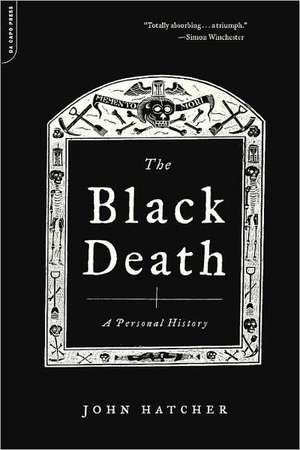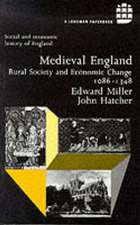The Black Death: A Personal History
Autor John Hatcheren Limba Engleză Paperback – 8 iun 2009
In this fresh approach to the history of the Black Death, John Hatcher, a world-renowned scholar of the Middle Ages, recreates everyday life in a mid-fourteenth century rural English village. By focusing on the experiences of ordinary villagers as they lived—and died—during the Black Death (1345–50 AD), Hatcher vividly places the reader directly into those tumultuous years and describes in fascinating detail the day-to-day existence of people struggling with the tragic effects of the plague. Dramatic scenes portray how contemporaries must have experienced and thought about the momentous events—and how they tried to make sense of it all.
| Toate formatele și edițiile | Preț | Express |
|---|---|---|
| Paperback (2) | 53.81 lei 3-5 săpt. | +27.58 lei 7-11 zile |
| Orion Publishing Group – 9 iul 2009 | 53.81 lei 3-5 săpt. | +27.58 lei 7-11 zile |
| Hachette Book Group – 8 iun 2009 | 119.55 lei 3-5 săpt. |
Preț: 119.55 lei
Nou
Puncte Express: 179
Preț estimativ în valută:
22.88€ • 23.99$ • 19.04£
22.88€ • 23.99$ • 19.04£
Carte disponibilă
Livrare economică 11-25 martie
Preluare comenzi: 021 569.72.76
Specificații
ISBN-13: 9780306817922
ISBN-10: 0306817926
Pagini: 352
Ilustrații: 16 pages b/w photos
Dimensiuni: 152 x 229 x 25 mm
Greutate: 0.54 kg
Editura: Hachette Book Group
Colecția Da Capo Press
Locul publicării:United States
ISBN-10: 0306817926
Pagini: 352
Ilustrații: 16 pages b/w photos
Dimensiuni: 152 x 229 x 25 mm
Greutate: 0.54 kg
Editura: Hachette Book Group
Colecția Da Capo Press
Locul publicării:United States
Notă biografică
John Hatcher, a leading expert in medieval and early modern social and economic history, is Professor of Economic and Social History and Chairman of the History Faculty at the University of Cambridge.
Recenzii
Bookviews.com, July 2009
“This book uses a bit of fiction, mixing it with [Hatcher’s] vast knowledge to illuminate that catastrophe.”
Curled Up with a Good Book
“This book screams ‘docudrama.’ One wonders if it will be made into a TV mini-series, so vivid is its novelistic story line yet accurate its information…What Hatcher has done, and done well, is to tell the tale of the Black Plague that swept through Europe in the 14th century from the viewpoint of a single English village.”
Cleveland Plain Dealer, 8/7/09
“The core of the story -- the plague’s effect on the lives of everyday people-- is as true as can be surmised, nearly 700 years later.”
History in Review, 10/19/09
“Will enthrall both historians and fans of historical fiction…Provides a fascinating and unique glimpse into what life was like in rural, mediaeval England, during the 1345-1350 plague outbreak…An informative and entertaining book to read on the Black Death and, more important, on how it affected the common people.”
Metapsychology Online Reviews, 3/19/10
“The psychological turmoil for those living through the plague’s visitation and the terror, grief and horror such an experience engendered, are vividly brought to life in John Hatcher’s magisterial ‘personal history’…A fascinating and absorbing ‘literary docudrama’…of the profound effects of a calamitous and unfathomable event on both the individual and collective psyche…It is for his deliberately novel (and novelistic) approach that the author is to be particularly commended…Provides an admirable insight into how the majority of society struggled to make sense of a world turned upside down…Likely to appeal not only to historians of the Middle Ages and of medicine, but also to those interested in how individuals and communities alike cope with, respond to, and in many cases survive, catastrophic circumstances.”
“This book uses a bit of fiction, mixing it with [Hatcher’s] vast knowledge to illuminate that catastrophe.”
Curled Up with a Good Book
“This book screams ‘docudrama.’ One wonders if it will be made into a TV mini-series, so vivid is its novelistic story line yet accurate its information…What Hatcher has done, and done well, is to tell the tale of the Black Plague that swept through Europe in the 14th century from the viewpoint of a single English village.”
Cleveland Plain Dealer, 8/7/09
“The core of the story -- the plague’s effect on the lives of everyday people-- is as true as can be surmised, nearly 700 years later.”
History in Review, 10/19/09
“Will enthrall both historians and fans of historical fiction…Provides a fascinating and unique glimpse into what life was like in rural, mediaeval England, during the 1345-1350 plague outbreak…An informative and entertaining book to read on the Black Death and, more important, on how it affected the common people.”
Metapsychology Online Reviews, 3/19/10
“The psychological turmoil for those living through the plague’s visitation and the terror, grief and horror such an experience engendered, are vividly brought to life in John Hatcher’s magisterial ‘personal history’…A fascinating and absorbing ‘literary docudrama’…of the profound effects of a calamitous and unfathomable event on both the individual and collective psyche…It is for his deliberately novel (and novelistic) approach that the author is to be particularly commended…Provides an admirable insight into how the majority of society struggled to make sense of a world turned upside down…Likely to appeal not only to historians of the Middle Ages and of medicine, but also to those interested in how individuals and communities alike cope with, respond to, and in many cases survive, catastrophic circumstances.”
Descriere
In this fresh approach to the history of the Black Death, John Hatcher, a world-renowned scholar of the Middle Ages, recreates everyday life in a mid-fourteenth century rural English village. By focusing on the experiences of ordinary villagers as they lived—and died—during the Black Death (1345–50 AD), Hatcher vividly places the reader directly into those tumultuous years and describes in fascinating detail the day-to-day existence of people struggling with the tragic effects of the plague. Dramatic scenes portray how contemporaries must have experienced and thought about the momentous events—and how they tried to make sense of it all.


















